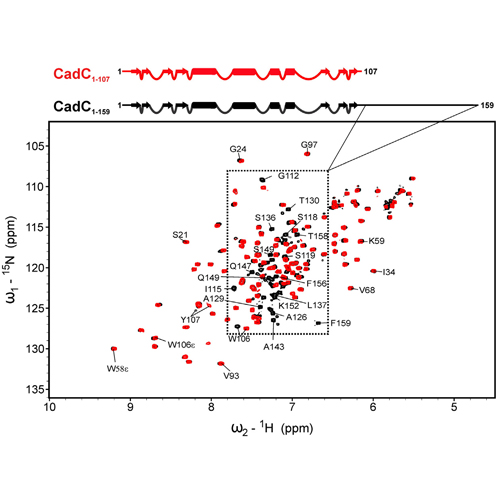Structural and Functional Analysis of the Signal-Transducing Linker in the pH-Responsive One-Component System CadC of Escherichia coli
12-May-2015
Journal of Molecular Biology, 2015, doi:10.1016/j.jmb.2015.05.001, published on 12.05.2015
Journal of Molecular Biology, online article
Journal of Molecular Biology, online article
The pH-responsive one-component signaling system CadC in Escherichia coli belongs to the family of ToxR-like proteins, whose members share a conserved modular structure, with an N-terminal cytoplasmic winged helix–turn–helix DNA-binding domain being followed by a single transmembrane helix and a C-terminal periplasmic pH-sensing domain. In E. coli CadC, a cytoplasmic linker comprising approximately 50 amino acids is essential for transmission of the signal from the sensor to the DNA-binding domain. However, the mechanism of transduction is poorly understood. Using NMR spectroscopy, we demonstrate here that the linker region is intrinsically disordered in solution. Furthermore, mutational analyses showed that it tolerates a range of amino acid substitutions (altering polarity, rigidity and α-helix-forming propensity), is robust to extension but is sensitive to truncation. Indeed, truncations either reversed the expression profile of the target operon cadBA or decoupled expression from external pH altogether. CadC dimerizes via its periplasmic domain, but light-scattering analysis provided no evidence for dimerization of the isolated DNA-binding domain, with or without the linker region. However, bacterial two-hybrid analysis revealed that CadC forms stable dimers in a stimulus- and linker-dependent manner, interacting only at pH < 6.8. Strikingly, a variant with inversed cadBA expression profile, which lacks most of the linker, dimerizes preferentially at higher pH. Thus, we propose that the disordered CadC linker is required for transducing the pH-dependent response of the periplasmic sensor into a structural rearrangement that facilitates dimerization of the cytoplasmic CadC DNA-binding domain.











